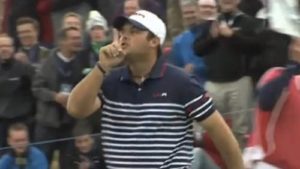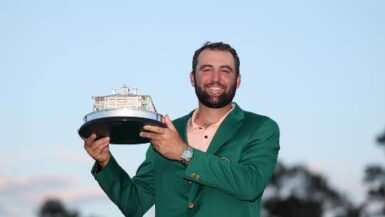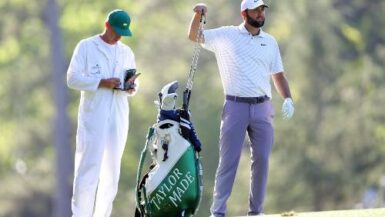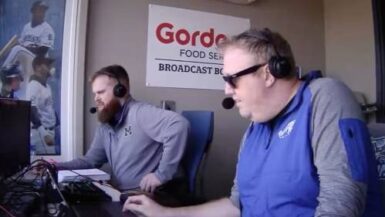
I first heard it as a middle-schooler taking my initial steps in studying the craft of story writing. I hated its disingenuousness then, and my distaste for it grows with each passing year – that old journalistic saw:
“Where heroes don’t exist, it is necessary to invent them. It’s good for public morale.”
Author Dan Jenkins always said we sports writers can impugn a hell of a lot of grace and class to guys who win major championships and other trophies, and you, Dear Reader, should never lose sight of that. Always ask yourself: What are they trying to sell me? Even now, the hagiographic hero worship of Tiger Woods will lead future generations to believe he was as important culturally as some Egyptian Pharaoh or Roman Caesar.
He’s tied for 41st as we go to press, by the way…
But what do we do about Patrick Reed? The proverbial bull in china shop, should he win the Masters? He’s got John Daly’s manners, but Ben Hogan’s work ethic on the range. He’s an incendiary talent with a mercurial personality. Troubles follow him like crows. He won two NCAA championships despite being hated by his teammates. (They actually went up to his opponent in the NCAA Finals and told the guy, “We want to win the title, but we hope you kick the shit out of Patrick Reed.”) And according to Sports Illustrated’s Alan Shipnuck, the writer who probably knows Reed best as author of not one but two seminal articles on him, Reed and his wife Justine once had Reed’s own parents escorted off a U.S. Open venue for the unpardonable sin of showing up to watch him play. What do we do if he wins?
Sadly, we have to grin and bear it, just like all the other times, and besides: being a hero or a villain is all a matter of perspective.
Never forget: during the heyday of Arnie’s Army, Jack Nicklaus was the villain. He was a fat, cigarette smoking, jumped up kid from a chichi country club (Scioto, in Ohio, where Bobby Jones won the 1926 U.S. Open). He had the audacity to ruin the feel-good, hometown story of Arnie triumphing at Oakmont. Then he dominated the Masters in record setting fashion the very next year. “Nick-lousy” his detractors called him, saying it was too much to fast, until Jack changed himself. Winning helped too – it always does – but so did genuine, sincere, self-introspection. Jack went on a diet. He quit smoking on the golf course. And he became as magnanimous as possible.
Jack learned. But it was also inherent in him. After all, golf teaches those lessons by osmosis.
Phil Mickelson was disliked on Tour for a few years when he first came out. You’ll recall he bore a colorful acronym for a nickname that starts with the name of a fruit and won an informal and anonymous magazine poll of who was the biggest jerk n the locker room. But shortly thereafter – and we mean shortly – Phil, like Jack, quickly grew into the large mantle required of Ambassadors of the Game of Golf: capital A, G, and G.
Now Phil’s loved wherever he goes – even at the Ryder Cup.
Sergio Garcia had many more downs than ups before finally achieving Masters immortality last year. He was a PGA Tour villain for years, and fans and media across the globe rode him mercilessly. Now he names his daughter Azalea. In fact, many golfers who won the Masters were just beginning to blossom emotionally as well as athletically. They turned out to be just fine in the long run.
But also, sometimes, heels win the Masters.
Not everybody has Jack or Phil or Arnie’s grace, class, and gratitude. Sandy Lyle was always a lightning rod whenever and wherever he played. In his day, the Shropshire Slasher as some called him, was a club-throwing, f-bomb dropping, caddie-terrorizing tyrant. Everyone had to metaphorically swallow their bile when he won the Masters in 1988 and then do it for real when he served haggis for Champions Dinner. 1989 still holds the record for most steaks consumed in the bar on a Masters Tuesday evening. Lyle also won a Claret Jug, in 1985, an incongruousness only surpassed by John Daly winning one as well.
Vijay Singh is another misfit. He sprays tincture of deer antlers into his mouth, and then sues the PGA Tour over it. He’s surly, at times rude and condescending, and yet there he is with a Green Jacket. Thirty years from now, he’ll be hitting the ceremonial first tee shot, probably with Tiger Woods.
Ah, yes, Tiger. There seems to be an unlimited supply of turd polish to refurbish his image, no matter how many scandals hound him. Of course not a soul is talking about the latest – the accusation by his ex-girlfriend Kristen Smith that Woods threatened to release “compromising photos” of her if sahe didn’t honor a non-disclosure agreement.
Note to Kristen’s PR team: never drop anti-Tiger news during Masters week. He’s too insulated here. everyone is on their best behavior, even Vijay and Lyle.
Some of my colleagues are trying to tell everyone he’s – Finally! This time! For certain! – a changed man because…wait for it…Joe the caddie told them so.
I guess Baghdad Bob was on vacation.
Then of course there’s Bagdad Bubba – two-time winner Bubba Watson. Which incident do you need cited? Caddie abuse? Plaintively wailing to an unconvinced official that ants are a burrowing animal? (“But they burrow into the ground, don’t they? That’s a burrowing animal…”)
Short story long, fate don’t have a head. Sometimes Jack Nicklaus wins, and sometimes Tommy Aaron wins. The sun comes up the next morning anyway, and we move on to the U.S. Open.
So if Patrick Reed wins, we do what we always do – the same thing we do every time we vote for president in America – we hold your nose, pull the lever, and hope for the best. Is Patrick a changed man from his college days? Less abrasive? More earnest? Even Alan Shipnuck can’t tell for sure after two articles and several plates of Shrimp Alexander. He says he may be both. Which is probably true of many of us, depending who we ask. Who knows? Maybe the game will sort it out for us. Golf has a way of doing that, after all.




